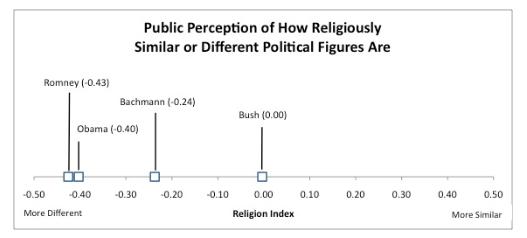By Public Religion Research Institute,
Washington, D.C.—Despite media attention to his Mormon faith, only four-in-ten Americans correctly identify Republican presidential candidate Governor Mitt Romney as Mormon, a new survey finds. The new PRRI/RNS Religion News Survey finds that more than 7-in-10 (72%) of Americans say Mormons hold religious beliefs that are somewhat or very different from their own. The survey, conducted by Public Religion Research Institute in partnership with Religion News Service, also finds perceptions of religious differences are correlated to support. Among all Americans, Romney currently trails President Obama in a head to head matchup by eight points (44% vs. 36%). Among the nearly half of Americans (46%) who say Mormons hold religious beliefs that are different from their own, Romney trails Obama by 21 points (49% vs. 28%).
“It’s really too early to gauge the full impact Romney’s religious identity will have on the election, but there are suggestive patterns,” said Dr. Robert P. Jones, CEO of Public Religion Research Institute. “Because views about the Mormon faith are tied to political support, Romney will need to continue to address these perceptions as Americans learn more about him during the campaign.”
The survey also finds that the public also continues to have difficulty correctly identifying President Obama’s faith. Only about 4-in-10 (38%) Americans correctly identify his faith as Christian, 18% continue to wrongly identify him as Muslim, and fully 4-in-10 say they don’t know what his religion is.
In addition to Mitt Romney and President Obama, the survey also asked respondents to gauge how similar their own religious and political views were to both Michelle Bachmann and George W. Bush.
“In general, there is a strong relationship between how similar Americans thought candidates were to their own political and religious beliefs,” said Daniel Cox, PRRI Research Director. “More than any other person we asked about, Americans make a greater distinction between how close they are to Romney’s political views and how close they are to his religious views.”
Among the Findings:
– Only 4-in-10 correctly identify Romney as Mormon; nearly six-in-ten say they do not know Romney’s religious beliefs (46%) or incorrectly identify him as a Protestant or Catholic (10%).
– Among all Americans, President Obama holds a slight edge over Mitt Romney and Michele Bachmann in head-to-head matchups for the 2012 election: 44% of Americans say if the election were held today they would vote for Obama, compared to 36% who say they would support Romney. Obama’s lead over Bachmann is similar (45% to 37%).
– Among Americans who identify with the Tea Party, Bachmann garners stronger support than Romney in a matchup against Obama (78% and 71% respectively).
– A majority (56%) of the public says it is very important or somewhat important for a presidential candidate to have strong religious beliefs regardless of whether those beliefs are the same as their own.
– Among Republicans and members of the Tea Party, more than 7-in-10 (71% and 72%) say it is somewhat or very important for a presidential candidate to have strong religious beliefs, compared to 51% of Democrats. Americans who identify with the Tea Party are more likely than Republicans to say it is very important for a candidate to have strong religious beliefs (46% to 38%).
– Majorities of every religious group say it is important that a candidate for President have strong religious beliefs, including white evangelicals (73%), minority Christians (74%), white mainline Protestants (57%) and Catholics (57%).
– Among those who say it is somewhat or very important for a candidate to have strong religious beliefs, both Romney and Bachmann lead in head-to-head matchups with Obama (Romney: 43% to 36%; Bachmann: 44% to 38%)
NOTE — The survey was designed and conducted by Public Religion Research Institute. Results of the survey were based on RDD telephone interviews conducted between July 14, 2011 and July 17, 2011 by professional interviewers under the direction of Opinion Research Corporation. Interviews were conducted among a random sample of 1,012 adults 18 years of age or older living in private households in the continental United States. The margin of error for the survey is +/- 3.0 percentage points at the 95% level of confidence.
Public Religion Research Institute is a non-profit, nonpartisan research and education organization dedicated to work at the intersection of religion, values and public life.
Disclaimer: Articles featured on Oregon Report are the creation, responsibility and opinion of the authoring individual or organization which is featured at the top of every article.



